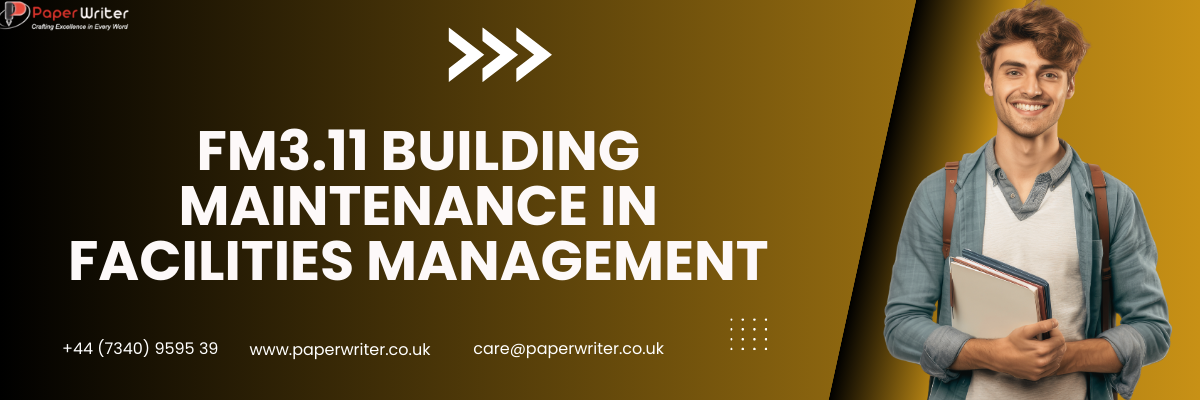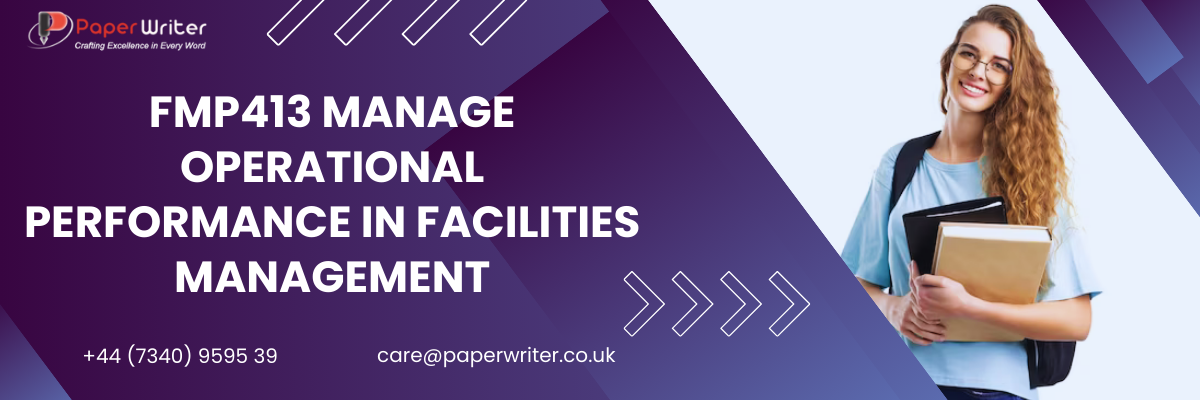Custom-Written, AI & Plagiarism-Free with Passing "Guaranteed"
FM3.15 Leadership, management and personal development
The main concern of the unit is to make the learners well-equipped with the useful skills and knowledge required in the leadership and management role excellence within the field of Facilities Management. This unit also greater a great variety of topics in terms of the theories of leadership, principles of management and strategies of personal development designed for the context of Facilities Management. The learners will also identify the multiple styles of leadership and their application in the setting of Facilities Management. They can also recognize the way of effective contributions of the leadership to the success of the organisation and the engagement of employees. Moreover, this unit also deals with the concept of management including leading, organising, controlling and planning comprised of their relevance to strategic decision-making and Facilities Management operations.
Personal development is another significant focus of the unit through which the students acquired the techniques for goal setting, ongoing improvement and self-assessment. The learners can also explore the strategies to improve their teamwork, communication, and resolution skills of conflict which are mandatory for effective management and leadership in FM roles. This unit also dynamics between personal development, leadership and Management within the context of the organisation. The learners will also be well-equipped with the practical Strategies and tools to lead their teams, provide personal growth and manage resources which will enable them to thrive in the career of profession within the industry of Facilities Management.
Unit objectives
The significant objectives of the unit FM3.15 Leadership, management and personal development are demonstrated below:
- To recognise the multiple styles of leadership and its application in the context of Facilities Management
- To explore the principles of management as organising, controlling, planning and leading within the operations of Facilities Management.
- To develop the skills for effective teamwork, communication and conflict resolution in the rules of Facilities Management leadership.
- To increase the knowledge of the personal development strategies that include goal setting and self-assessment.
- To analyse the character of Management and leadership in providing the engagement of employees and the success of organisations in Facilities Management.
- To apply theoretical concepts for practising the scenario, increasing the decision-making and abilities of problem-solving in the context of Facilities Management.
Learning outcomes
The significant learning outcomes of the unit FM3.15 Leadership, management and personal development are provided here:
LO1: Recognise theories of motivation, management and leadership.
LO2: Recognise the development of teams.
LO3: Recognise the legislation related to human resources, best practices and codes of conduct.
LO4: Recognise the cycle of human resources and the processes which are supported by them.
LO5: Recognise the management and monitoring of teams and individuals to accomplish the targets and objectives.
LO6: Recognise the personal development.
Assessment criteria
The assessment criteria of the unit FM3.15 Leadership, management and Personal Development deals with all the learning outcomes such as:
LO1: Recognise theories of motivation, management and leadership.
- 1.1 Assess the difference between management and leadership.
(Role’s distinction, styles and requirements, practical leadership aspects for example directing teams and communicating teams, redeploying and allocating tasks and staff, inspiring and empowering others, management of performance)
- 1.2 Examine the theory features of:
- Motivation
- Management
- Leader
(Behaviours including McGregor’s Theory Y and Theory X, Trait (Stogdill), Fiedler’s model of contingency, theory of situational leadership by Hersey-Blanchard, transformational or transactional leadership (Theory of MacGregor Burns), theory of 2-factor motivational by Hertberg, 14 management principles by Fayol, Taylorism)
- 1.3 Assessment of the multiple leadership styles according to their suitability in multiple contexts.
(Functional, autocratic, transformation, bureaucratic, transactional, participated or democratic, laissez-faire, Leadership continuum of Tannenbaum & Schmidt)
LO2: Recognise the development of teams.
- 2.1 Elaborate the properties of an effective team.
- 2.2 Elaborate on the techniques of team building (Tuckman, Belbin, Team dynamics).
- 2.3 Elaborate the difficult team structure and its supporting process (team management dynamics, communication, management).
- 2.4 Elaborate the techniques for managing the conflict within the team (5 Ws + H (Where, what, how, when, who, why), change model Pathways) .
- 2.5 Describe the target roles, feedback and objectives in the team development (using and setting KPIs, setting of objectives which are connected to the benchmark or SLAs) .
LO3: Recognise the legislation related to human resources, best practices and codes of conduct.
- 3.1 Elaborate on the requirements and purpose of human resources in terms of legislation, best practices and codes of conduct:
- Health and safety
- Inclusion
- Ethics
- Sustainability
- CSR corporate social responsibility
- Data production
- Diversity and equality
- TUPE
(Difference between codes of conduct, Legislation, regulation and best practice, employment law related to the contract, part or full time, Zero Hours, casual, management absence, corruption and bribery, PREVENT, WTD, Whistleblowing, safeguarding)
- 3.2 Elaborate on the requirements and purpose of the licence for practising, necessary qualifications and necessary training site.
LO4: Recognise the cycle of human resources and the processes which are supported by them.
- 4.1 Elaborate on the connection between the functions of human resources and other functions of the business.
- 4.2 Elaborate on the requirements and purpose of the process of human resources.
- Development and training
- Selection and recruitment
- Performance management
- Planning of success
- Career management
- Safeguarding and welfare
- Grievance and discipline
- Release
- 4.3 Elaborate the personal responsibilities to upload the policy and law of the organisation within these processes.
(Potential consequences in non-compliance)
LO5: Recognise the management and monitoring of teams and individuals to accomplish the targets and objectives.
- 5.1 Explain the properties of a useful system of performance management.
(Reviews in performance of regulatory, Appraisals, constructor feedback utilisation, information sources on the performance of individuals, evidence-based, feedback of 360 degrees, SWOT, recognition and rewards)
- 5.2 Describe the best practices in appraisal conduction.
- 5.3 Describe the optimisation of SMART (specific, measurable, Achievable, realistic, time-bound).
(Set the target of SMART, development needs identification, purpose of QA, efficiency, prioritisation, action plans Optimisation and PDPs)
- 5.4 Describe the factors that need to be addressed for managing the performance and welding of people.
(Protect the features for example religion, balance of work life, disability, flexible or single parent hours)
- 5.5 Elaborate on the techniques for people development.
(Mentoring, coaching, secondments, jobs shadowing, projects, Responsibilities of developing skills in people management)
- 5.6 Assess the manager`s and leaders` role in the Change management context.
(Change nature: transformation, incremental, plan and emergent change, revolutionary.
change theories; unfreeze-change-refreeze by Lewin, 7S by McKinsey, change theory by Kotter, change curve of Kubler-Ross, ADKAR (Awareness, Desire, knowledge, ability, reinforcement), theory of nudge, change process, Change management roles, dynamic environment in change management.
Significant elements and change agent rules in managing cultural change)
LO6: Recognise the personal development.
- 6.1 Elaborate on the responsibilities of a person for their personal development.
(Professional and personal development, development benefits)
- 6.2 Elaborate the feedback and Reflection role for development needs determination.
(Feedback sources, validity and reliability, reflective techniques and tools)
- 6.3 Elaborate the effective plan of development requirements to meet the personal and business needs.
(Future and recent development requirements teams and Roles, personal preferences, experience and skills, knowledge, personal objectives, business needs consistency)
- 6.4 Describes the suitability of multiple development forms for the purpose of personal development.
(Mentoring and coaching, training courses, practice, research, distance learning, study programs, professional network, learning styles understanding, job shadowing, reflective practices)
- 6.5 Explain the valuation way of the impact and effectiveness of personal development actions and plans taken.
(Alignment needs to personal development with the staff policy of organisational development for example job chat systems or appraisals)
Get mushroom growth in your marks by taking the help of writers in unit FM3.15
Explore the multiple factors through which we make your assignment on unit FM3.15 Leadership, management and Personal Development marks-generating for you:
We render exceptional content in the assignment
The research skills of our writers are incredible and they hit the books to make your work appealing. They add the justifications from the authentic platforms in your assignment and add their own experience and case studies to support the answers.
We understand the topic, discuss it with you and draft it
Our writers first understand your assignment question and discuss it with you after research and they start making drafts on it. When you approve the draft we start working on it.
We have elevated and professional writers
We hired the writers after taking their tests and checking their eligibility. All of the writers we have are experienced and educated with having the degrees of PhD and masters in facilities management.
We never break the bank of our clients
Our charges are reasonable so that every student from any corner of the world can approach us. We have designed our charges of assignment by keeping us in the shoes of students.
We put the versatile referencing styles
We add the references according to your instructions in appropriate styles such as APA, MLA, Oscola, etc. We add accurate in-text citations to your assignment tasks.
We offer unlimited chances for revisions
You can get multiple chances of the modifications in your assignment so that you can make the variations in your work according to your requirements and teacher’s instructions.
You can ask us anytime about your hassles
We provide assistance to our customers by remaining available 24/7 and we reply to your queries within a few seconds.
Your privacy will remain to cater here
We take care of your work and assignment privacy so you can stay stress-free from assignment difficulty.
You will get original content free from plagiarism and AI
We offer the assignment content prepared on the originality attributes in which the whole content is free from AI and plagiarism. You can get the Turnitin report to check the assignment`s uniqueness.






